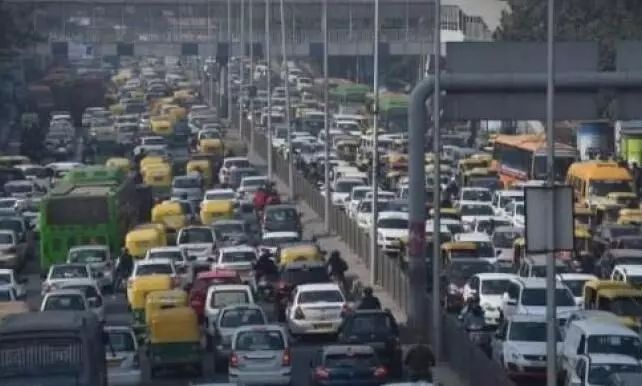
Report recommends banning diesel 4-wheelers in cities by 2027
text_fieldsNew Delhi: Four-wheel vehicles run on diesel in cities with over 10 lakh population should be replaced with electric and gas-fuelled vehicles by 2027 and motorcycles, scooters, and three-wheelers with internal combustion engines should be phased out engines by 2035, a report a committee headed by former Oil Secretary Tarun Kapoor has recommended.
The panel, which was appointed by the Oil Ministry, submitted the report to the government in February this year. However, the government has yet to accept the report.
“EVs may be promoted as the optimal solution in preparing for phasing out internal combustion engine two / three wheel vehicles by 2035. In the intermediate period, policy support for ethanol-blended fuel with an increasing blend ratio needs to be given,” the report said.
It called for four-wheelers, including passenger cars and taxis, to partially shift to electric and partially to ethanol-blended petrol with almost 50 per cent share in each category.
“Diesel-driven 4-wheelers may be eliminated as soon as possible. Therefore, a ban on diesel-powered four-wheelers in all million-plus cities and all towns with high pollution has to be enforced in five years, i.e. by 2027,” the report said.
For transitioning to EVs, CNG as a transition fuel (up to 10-15 years) has been emphasised. “Vehicles with flex-fuel capabilities and hybrids may be promoted in the short and medium terms. This can be done through the application of fiscal tools like taxation,” it said.
To boost electric vehicle, use in the country, the report said the government should consider a “targeted extension” of incentives given under the Faster Adoption and Manufacturing of Electric and Hybrid Vehicles scheme (FAME) beyond March 31.
The report favoured new registrations of only electric-powered city delivery vehicles from 2024 and suggested higher use of railways and gas-powered trucks for the movement of cargo.
These steps will help India achieve the goal of cutting its emissions to net zero by 2070. Net zero, or becoming carbon neutral, means not adding to the amount of greenhouse gases in the atmosphere.
India is the world’s fourth biggest emitter of carbon dioxide after China, the US and the EU. But its huge population means its emissions per capita are much lower than other major world economies. India emitted 1.9 tonnes of CO2 per head of population in 2019, compared with 15.5 tonnes for the US and 12.5 tonnes for Russia that year.
Towards net zero, the government has set a target to get 50 per cent of the nation’s energy from renewable resources by 2030, and by the same year to reduce total projected carbon emissions by one billion tonnes.
For transition, it is looking to boost the use of natural gas, which is less polluting than liquid fuels like diesel, in industries and automobiles. India aims to raise the share of natural gas in its energy mix to 15 per cent by 2030 from 6.7 per cent now.
The report said petrol and diesel demand in India is expected to peak in 2040 and decline post that due to the electrification of vehicles. LPG demand is expected to decline after 2030 due to the electrification of cooking and reduce to zero with 100 per cent electrification by 2070.
The demand for aviation fuel will continue to grow at 3.5 per cent CAGR but will be gradually substituted by sustainable fuel. Naphtha demand is expected to rise at 4.5 per cent CAGR (2030-50) and 2.3 per cent compound annual growth rate CAGR (2050-70) because of increasing demand for petrochemicals.
“The rate of transition in fossil fuel consumption is primarily dependent on the shift in the auto sector to EVs. With an aggressive transition to EVs due to policy mandates, there will be accelerated repurposing/closure of refineries for renewable energy/biofuel production and reduction of overall carbon footprint,” it said.
With PTI input
























